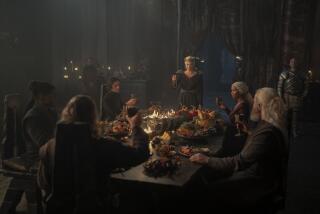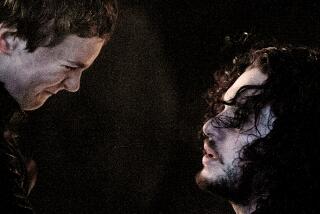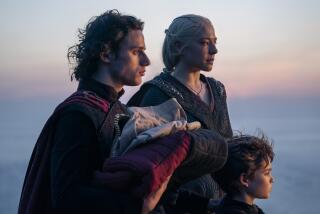Op-Ed: ‘Game of Thrones’: A brief history of the Dothraki language
In the first season of HBO’s “Game of Thrones,” Illyrio Mopatis introduces Drogo, the ruler of the Dothraki, to Daenerys Targaryen, the descendant of a deposed royal family. It’s not a particularly noteworthy scene, except in that it was the first to include an invented or constructed language. When Drogo appears on screen, Illyrio greets him in Dothraki. “Athchomar chomakaan, khal vezhven!” he says, meaning: “Respect to one that is respectful, great king.”
“Game of Thrones” would go on to feature more “conlang” material than any other television show in history by a wide margin, with sustained dialogue in Dothraki as well as High Valyrian and Low Valyrian. I’m the lucky one who got to create those languages.
When I sat down to compose what would become Dothraki, I knew where I had to start: the words that George R.R. Martin had invented. Martin is, of course, the man who wrote the wildly imaginative, sprawling fantasy novels that D.B. Weiss and David Benioff adapted for HBO. Any Dothraki word or name that he’d put to paper was considered sacrosanct, not to be ignored or altered.
The first step, then, was to figure out what words I had to work with and how I could use them as a guide to fleshing out the rest of the language.
In the first three books of the Song of Ice and Fire series, there are 56 words from the Dothraki language. Of those, 24 are proper names. The other 32 are nouns, verbs and adjectives with various meanings. Ignoring the meanings at first, I set to work analyzing the syllables.
All languages operate according to rules regarding syllable and word formation. By looking at just about any word in a given language, you can deduce some of these.
If, for instance, a linguist stumbled across the word “star,” she’d guess — even without knowing English — that there were other words with the same structure: two consonants followed by a vowel followed by another consonant. And in fact there are many English words with the same structure: spar, stat, trim, clip, prom, etc.
Looking at Martin’s words, I noticed patterns such as the following (below, “kh” and “sh” are treated as single consonants):
Consonant-vowel-consonant: khal, dosh, haj, rakh, qoy, khas
Consonant-consonant-vowel-consonant: mhar, rhan
Consonant-vowel-consonant-vowel: qiya, rakhi
Having identified these patterns, I created more roots, giving HBO’s Dothraki a vocabulary that would look similar to Martin’s:
Consonant-vowel-consonant: lekh, ren, haf, san, mil
Consonant-consonant-vowel-consonant: nhazh, rhal, qwil, krol, gref
Consonant-vowel-consonant-vowel: qora, gosi, thima, zemo, lofi
Beyond replicating patterns, I wanted to meet the producers’ expectations that Dothraki seem “harsh,” since the Dothraki are a rough, warlike people. That actually wasn’t much of a challenge.
There is no such thing as a harsh-sounding language per se — there are only languages that sound harsh to the ears of those who speak a different-sounding language. Knowing that English speakers were our primary audience, the inclusion of the throaty fricative “kh” was enough to satisfy the producer’s request. It didn’t hurt that the actor who played Drogo, Jason Momoa, has a rumbly bass voice.
Once I’d worked out a logically consistent sound for Dothraki, I could turn to the grammar.
Although Martin claimed he made up phrases on the spot, I was delighted to find that his language examples were grammatically consistent. The most easily analyzed multi-word sample of Dothraki in the text is “Rakh! Rakh! Rakh haj!,” which is translated as “A boy! A boy! A strong boy!” Based on the translation, rakh must be “boy,” which means that haj must be “strong” — suggesting that, in Dothraki, adjectives and other modifiers follow nouns.
Other examples supported my theory. Daenerys’ hated brother Viserys is referred to by the Dothraki as Khal Rhaggat, “Cart King,” and Khal Rhae Mhar, “Sore Foot King.” We know that khal is translated as “king,” which means that the words following it in each of these epithets are the modifiers, preserving the order seen in “strong boy.”
Looking at the rest of the utterances, I noticed other evident orderings (objects following verbs, prepositions preceding nouns), and soon I had a fair typological description of the language. After that, it was up to me to decide how I wanted the rest of the grammar to work — verb tense and aspect, nominal number and case inflection, adjectival agreement, etc.
For Dothraki, I really wanted to employ nominal cases — meaning the form of a noun changes depending on its grammatical role in the sentence. If chomak means “respectful one,” it must change to chomakes if it’s used as the object of a verb, or chomaki if it possesses another noun (e.g. vezh chomaki, “the respectful one’s stallion”). This is something I hadn’t seen other Hollywood languages do, so I wanted to seize the opportunity to try something new.
Ultimately, the language had to match fan expectations and work on screen. Returning to the first sentence of Dothraki: Athchomar chomakaan, khal vezhven!
The word khal is from Martin; the rest are my creations. The highest compliment I receive is when fans of the literary series tell me they can’t tell the difference between the words I created and the ones Martin did.
David J. Peterson is a professional conlanger who’s worked on productions such as HBO’s “Game of Thrones,” Syfy’s “Defiance” and “Dominion,” and the CW’s “The 100.” His book, “The Art of Language Invention,” comes out in September.
Follow the Opinion section on Twitter @latimesopinion and Facebook
More to Read
A cure for the common opinion
Get thought-provoking perspectives with our weekly newsletter.
You may occasionally receive promotional content from the Los Angeles Times.










